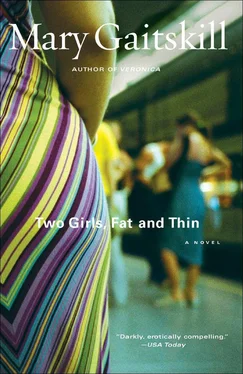Mary Gaitskill - Two Girls, Fat and Thin
Здесь есть возможность читать онлайн «Mary Gaitskill - Two Girls, Fat and Thin» весь текст электронной книги совершенно бесплатно (целиком полную версию без сокращений). В некоторых случаях можно слушать аудио, скачать через торрент в формате fb2 и присутствует краткое содержание. Год выпуска: 2012, Издательство: Simon & Schuster, Жанр: Современная проза, на английском языке. Описание произведения, (предисловие) а так же отзывы посетителей доступны на портале библиотеки ЛибКат.
- Название:Two Girls, Fat and Thin
- Автор:
- Издательство:Simon & Schuster
- Жанр:
- Год:2012
- ISBN:нет данных
- Рейтинг книги:5 / 5. Голосов: 1
-
Избранное:Добавить в избранное
- Отзывы:
-
Ваша оценка:
- 100
- 1
- 2
- 3
- 4
- 5
Two Girls, Fat and Thin: краткое содержание, описание и аннотация
Предлагаем к чтению аннотацию, описание, краткое содержание или предисловие (зависит от того, что написал сам автор книги «Two Girls, Fat and Thin»). Если вы не нашли необходимую информацию о книге — напишите в комментариях, мы постараемся отыскать её.
Review) create a haunting and unforgettable journey into the dark side of contemporary life and the deepest recesses of the soul.
Two Girls, Fat and Thin — читать онлайн бесплатно полную книгу (весь текст) целиком
Ниже представлен текст книги, разбитый по страницам. Система сохранения места последней прочитанной страницы, позволяет с удобством читать онлайн бесплатно книгу «Two Girls, Fat and Thin», без необходимости каждый раз заново искать на чём Вы остановились. Поставьте закладку, и сможете в любой момент перейти на страницу, на которой закончили чтение.
Интервал:
Закладка:
Mary Gaitskill
Two Girls, Fat and Thin
For my parents, with appreciation.
Part One
All one could do was to glimpse, amid the haze and chimeras, something real ahead, just as persons endowed with an unusual persistence of diurnal cerebration are able to perceive in their deepest sleep, somewhere beyond the throes of an entangled and inept nightmare, the ordered reality of the waking hour.
— VLADIMIR NABOKOV, Speak, MemoryChapter One
I entered the strange world of Justine Shade via a message on the bulletin board in a laundromat filled with bitterness and the hot breath of dryers. “Writer interested in talking to followers of Anna Granite. Please call—.” It was written in rigorous, precise, feminine print on a modest card displayed amidst dozens of cards, garish Xeroxed sheets, newsprint, and ragged tongues of paper. The owners of this laundry establishment seem to have an especially lax policy when it comes to the bulletin board, and upon it any nut can advertise himself, express an inane opinion, or announce a slogan amid a blathering crowd of ads for Gorill-O-Grams, lost cats, plaintive George (wearing a tiny amethyst earring, gray leather boots) searching for “provocative boy in tight silver pants who asked tall black man for fabric softener,” Micro-Cosmic Orbit Meditation Lessons, Yes Sir!: The All-Boy Maid Service, and Spiritual Karate for Women. That day there was even an especially sinister card bearing an invitation to submit to tests that would determine whether or not your suicidal depression could be alleviated by “the latest medication” or hypnotic technique — an invitation evoking images of bulimic girls held prisoner in somebody’s basement, drug-addicted prostitutes confessing to severe men in white coats, electrodes wired to the naked bodies of frightened volunteers, rec rooms erupting with violence, all made doubly queasy by their proximity to wretched George with his laundry. Nestled in this shoddy configuration of suggestion, promise, and nightmare, the writer’s card implied a lone kook gripping a grimy sheaf of papers, philosophical tracts, and paperback books, her jaw clenched, her face unnaturally pale. This is the kind of image that is, no doubt, associated with Anna Granite in the dull minds of those who peruse such bulletin boards carelessly, half-registering the muted snarl of urgency and need — but I knew differently.
I shifted my recalcitrant laundry in my arms and snatched the card from the board, not caring if anyone else wanted to read it or not. I went home, put away my laundry, and sat brooding with coffee and card. It had been years since anyone had expressed professional (or was it professional?) interest in Anna Granite, philosopher and literary genius. I read the card repeatedly, trying to deduce something from its hieroglyphical simplicity. Granite had enemies, even in death. I had made the mistake of talking to them in the past, seduced, as all of us were, by the glamour of flashing lightbulbs, microphones, hysterical questions, and so on. But that had been at least fifteen years ago, and this “writer” seemed too insubstantial to bear the weight of such mania.
Why talk to an insubstantial person? I finished my coffee, ate a Gruyère brioche, and left the apartment to go to work. I am thirty-four years old and I live in Queens. I am a proofreader on the midnight shift at a Wall Street law firm, and the hour of my departure for work is bleak and dark. That night the street featured only a few abstracted pedestrians: a guarded young woman in a raincoat carrying a brown-bagged carton of milk, a pair of subdued boys coming around the corner with their hands thrust into their pockets, a dog-walker clutching a wad of paper towels, and a moody doorman pacing in a vigilant circle. I entered a delicatessen which displayed boxes of detergent, stomach medicines, and bottled spring water in its windows. I purchased a handful of rum-flavored marzipan candies, each wrapped in bright red tinfoil bearing a picture of a mysterious brown-haired Victorian lady in décollétage, then I stepped into the street and hailed a cab. The driver and I exchanged mumbles, his ticking metal box lit up, and I sped to the office where my booth awaited me, nestled amid the flanks of word-processing machines, all faithfully burning their little green lights.
But I couldn’t forget “writer.” As I re-entered my apartment at 9:00 the following morning, I felt the harsh splendor of Granite’s presence arrayed through all my rooms. I had never forgotten her, of course. Her books were all upright on my shelves, and the mighty power of her ideas continued to form the undercurrent that bore along the details of my uneventful and increasingly rancorous life. But Anna Granite had died two years earlier, and I had been disassociated from the remnants of her dwindling movement for longer than that. This was the first time in years that I had felt the almost visceral sensation of the woman’s presence, which was nothing short of a shimmering, diamond-studded aurora borealis. It was as if this star system had become hidden, bound in a thick skein of ordinariness, and that “writer,” with his/her innocuous request, had peeled off a corner of the binding, causing all that I had never really abandoned to come tumbling into my living room.
As I lay in my bed in my plaid flannel nightgown, Granite’s characters crowded round me. Solitaire D’Anconti, oil magnate and lonely woman, paced the room in her black plunge-necked jumpsuit, one arm wrapped around her own slim waist, the other holding the cigarette which issued the snake of smoke that was coiling around her. Bus Taggart, the hood who worshipped her, sat on the windowsill, struck a match against his shoe, and sighed. Skip Jackson, newspaper baron and Solitaire’s lover, leaned against the wall, watching Solitaire with a savage smirk on his face. What were they going to do? Eustace Kwetschmer, editor of a rival newspaper, had started a series of stories exposing Solitaire’s connections with Bus; she had been subpoenaed to testify before a grand jury. Skip was willing to fight back on her behalf, even if it meant destroying his own newspaper empire. Solitaire, who scorned public opinion, was pleading with him to stay out of it. Meanwhile, the world was on the brink of destruction.
I got out of bed and went into the kitchen to look at the card. It seemed foreign, forlorn yet compelling for an index card. I returned to bed with it and snuggled under the blanket; I had been working the graveyard shift for six years, but my body still contracted at various crucial points in my neck, pelvis, and shoulders after staying up all night. I tried to relax my spastic muscles and lay on my stomach to reach for the sleek pink phone beside my bed. I dialed the number offered by “writer.” There was no answer, not even a recorded voice informing me that its author could not “come to the phone right now.” I hung up, relieved; my mental state, induced by such sudden contact with Granite’s fictional universe, was not one that could be shared with the prosaic writer.
I dug back into bed, cozily rubbing the inevitable granules away with my feet. In my mental parade, Granite’s characters were followed by the four-square humans who had surrounded her, and the sensational drama of her life began to merge with the drama of her books. I saw Granite at the podium, her eyes storming as she lashed out at an idiot heckler from the audience who had stood during the question-and-answer period to say, “Doesn’t your insistence on strictly objective truth lead to a kind of authoritarianism that—” “You are an authoritarian of the worst kind!” snarled Granite. “The authority of ignorance, of nothingness, of hallucination!” The article that appeared in
Читать дальшеИнтервал:
Закладка:
Похожие книги на «Two Girls, Fat and Thin»
Представляем Вашему вниманию похожие книги на «Two Girls, Fat and Thin» списком для выбора. Мы отобрали схожую по названию и смыслу литературу в надежде предоставить читателям больше вариантов отыскать новые, интересные, ещё непрочитанные произведения.
Обсуждение, отзывы о книге «Two Girls, Fat and Thin» и просто собственные мнения читателей. Оставьте ваши комментарии, напишите, что Вы думаете о произведении, его смысле или главных героях. Укажите что конкретно понравилось, а что нет, и почему Вы так считаете.












